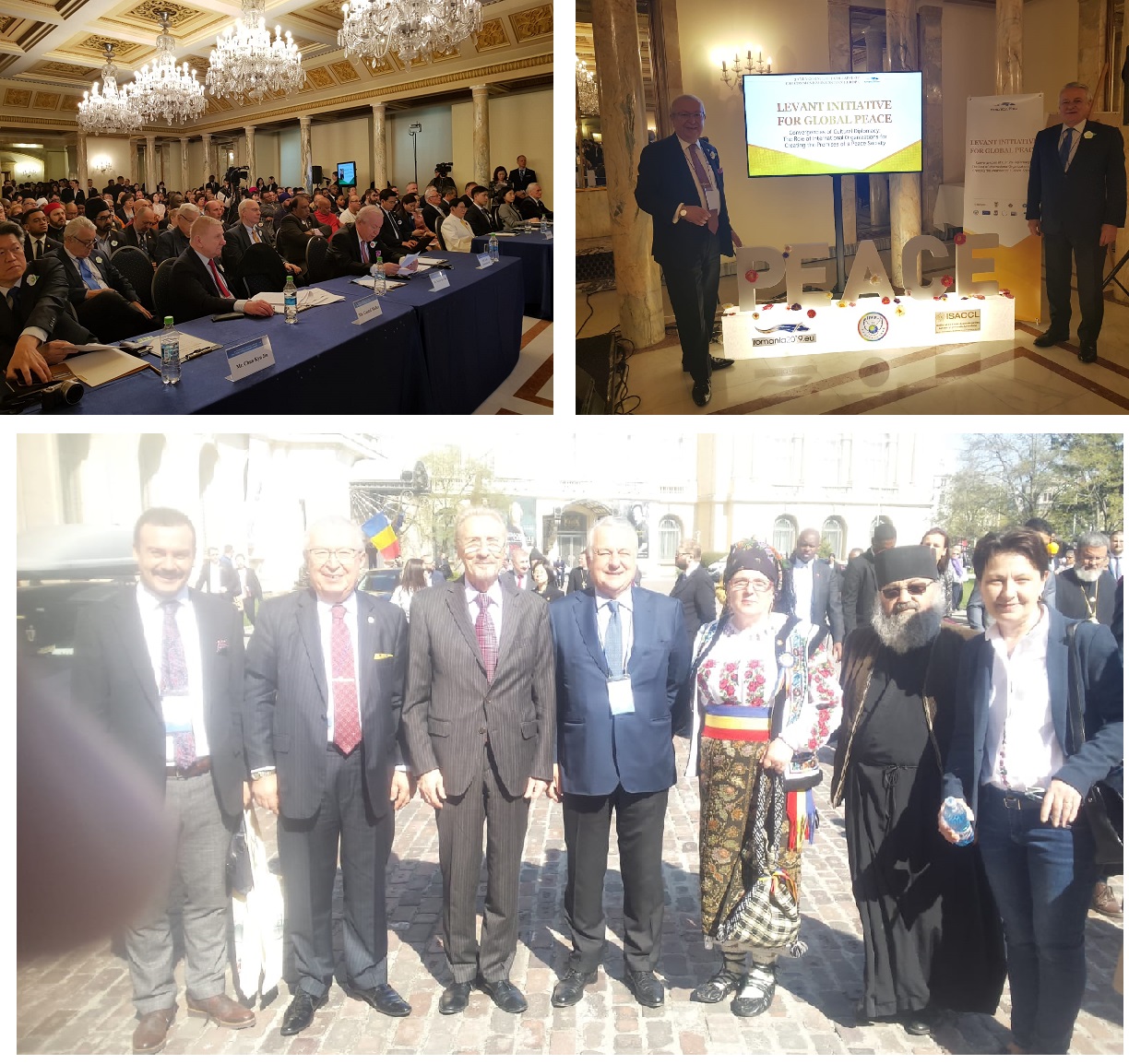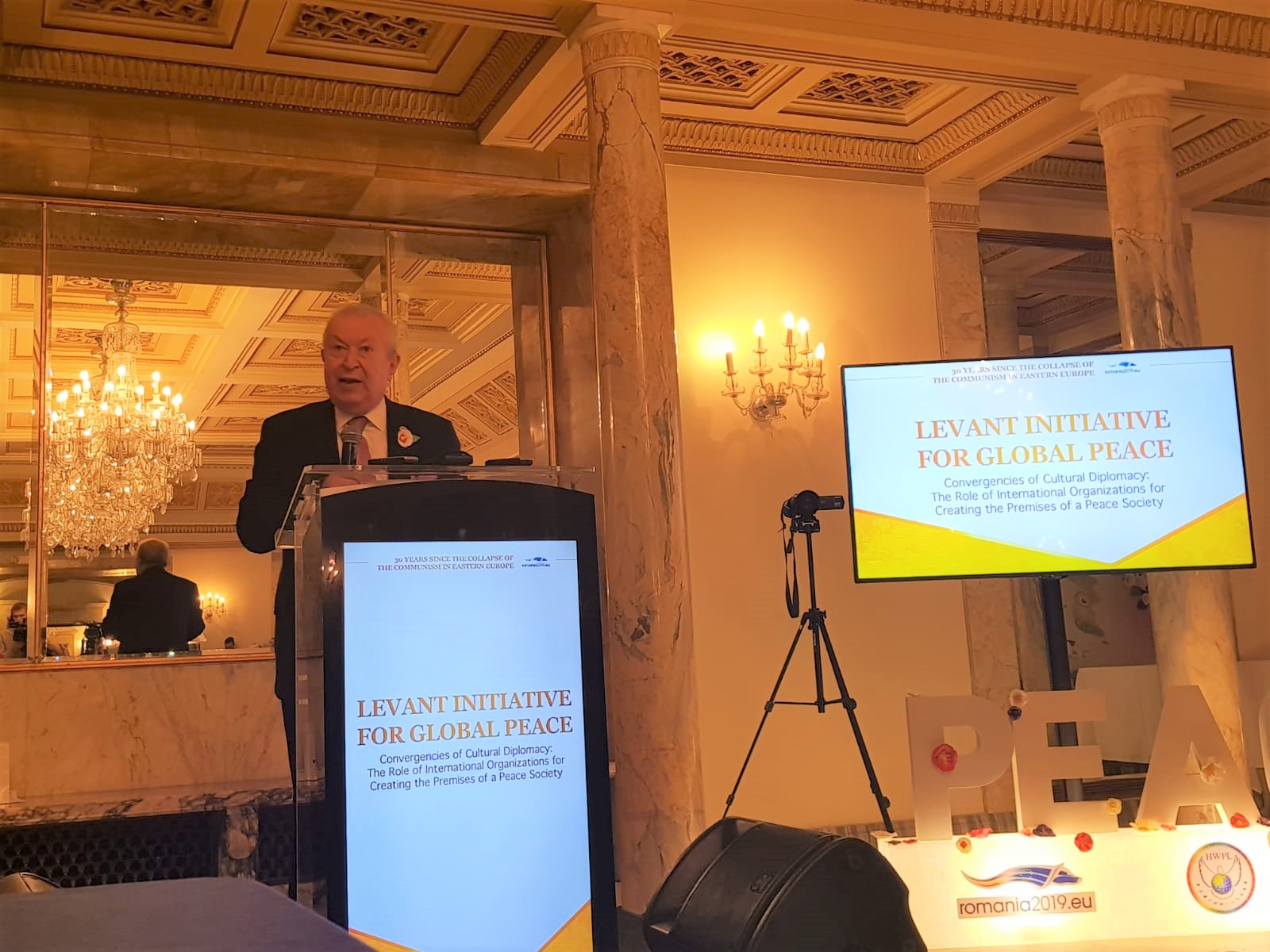Dr. Akkan Suver speaks at the Levant Institute Meeting
Dr. Akkan Suver spoke at the meeting of the Levant Institute for Global Peace, held at the Royal Palace in the capital of Romania Bucharest. In his speech, Dr. Akkan Suver talked about the contribution of Levantines to globalization and peace.

The speech of Dr. Akkan Suver is as follows:
We gathered here today to discuss the subject of historical Levant.
First of all, I would like to say by highlighting that, Levantines had lived the idea of the globalization about hundreds of years ago that we keep on the agenda today with the best examples in Izmir, Beirut, Alexandria, Istanbul and Thessaloniki.
In reality it is a project of peace and coexistence, Levantism. İzmir, Beirut, Alexandria, and Thessaloniki are the cities that had find the elixir of living together in peace. In these cities, the business agreements could come before the needs and ideals of the city. The things that give energy and life to Levantine cities were variety and independence . Catholics, Orthodox, Jews and Muslims were enlightened by living together.The measure of belonging to Levantine cities was British in Alexandria, French in Beirut, Greek in Thessaloniki and İzmir, and Ottoman in Istanbul. Levantines have exhibited the examples of coexistence while engaging with trade.
Alexandria was the Queen of the Mediterranean. As for, Beirut was called the Paris of the Middle East. And Alexandria had been called as the key to Egypt. While Izmir and Thessaloniki were named as the city of the merchants, Istanbul was living in the unique conditions as the capital of the Ottoman. Life was intertwined in these cities that have been mentioned. Greek, Armenian, French, Hebrew, English, Italian, Arabic was spoken together with Turkish.
The religious people respected to each other. The rules of trade were valid in honesty. The level of education was high among Levantines. Levantines had been the first examples of global peace without knowing and without being aware of it.
Famous writer Jo Boulad said that: 'In a Mediterranean city you never lose hope. The sea always brings something." Yes, with our belief that the sea will always bring something, what we see when we look at the Levantine cities today is good developments.Alexandria re-connects with the outside world. Alexandrialogy has reviving together with Leopold Senghor University which has devoted to the development of Africa, Arab Maritime University, Private Pharos University.
As stated in Library of Alexandria, II. Ptolemaios's gigantic statue from the sea and modern bust of Alexander the Great, in the organization plaque; " While serving as a flashlight, it remains a venue for peoples and intercultural dialogue." The Library tries to connect Alexandria to both the outside world and its past.
When it comes to Beirut, still has the chance to rejoin other global cities, despite catastrophic adherence of some of its inhabitants. Beirut is commited to it's role as the window to the world. It is determined to maintain the dynamic of interaction of multiculturalism as well as trade. Arabic and French book fairs continue to be established here every year. In Beirut, Arabic, French and English can be used simultaneously, even can be used in the same sentence as "-yallah, bye-bye, mon vieux". With it's conflicts, coincidences, universities and refugee camps, with the position in the fault line between the East and the West, between religion and secularism, between the city and the state, both fragile and resilient between the shore and the land, Beirut remains the center of the world debate.When it comes to İzmir, this city is not only the commercial center of Turkey but also the center of multiculture. . As a multicultural, multi-ethnic and multi-religious city, Izmir is a magnificent city with unique characteristic mosques, synagogues and churches side by side. İzmir with it's structure that has the characteristics of almost all nations and the same broad range of human passions, continues to this day to represent the modern face of Turkey. If we say that İzmir is still the Paris of the Levant, we will not exaggerate.
As for Thessaloniki, Thessaloniki turned into a provincial city from a multi-ethnic, multicultural metropolis. Thessaloniki is a city that has lost its past, has lost its bright people to Athens. It has moved away from the Levantian philosophy by breaking down its high values and chasing away the Jews, the Catholics which were the elements that have made the city the Levantine. Today, Thessaloniki has consciousness far from Turks, Jews and Levantines. Thessaloniki which was multicultural yesterday, is looking for its old glory days.
İstanbul is a city of peace and solidarity today. This city, where Jewish, Catholic, Orthodox and Muslim coexist, continues to be accessible and attractive. Trade and diplomacy are characteristic of this city. Levantenism is still perceived here as sphericity and it has live on.
The spirit of Levantine is a way of peace and dialogue.
I would like to end my speech with a memory of the famous writer Pierre Loti of the Levantine era; For example, a writer talking about the Alexandria life: " In the mornings, you can instruct the servant in Arabic. You speak to barber in Greek. You speak Italian while shopping, When you're drinking five o'clock tea or playing billiards, you speak in English. Finally, it's usual to speak in French while having guests in the evening.
I'm going to have an addition to this writer. In my childhood in Istanbul there were so many Levantine families that they were born here, lived here and died here without learning a single word of Turkish. These people who live in their own world were actually a wealth for Thessaloniki, Izmir, Beirut and Alexandria. We are not aware of this wealth today.


